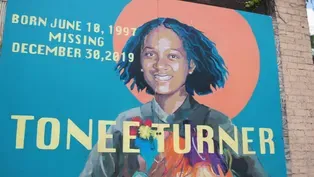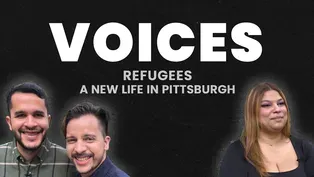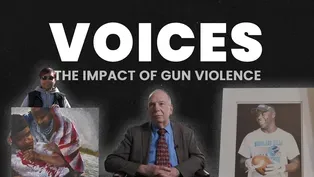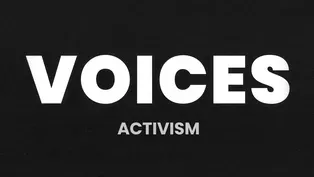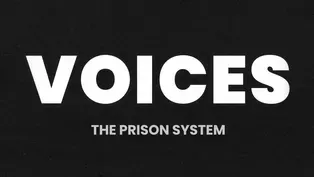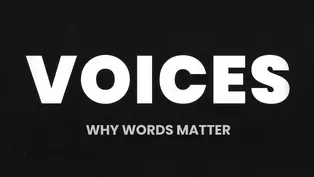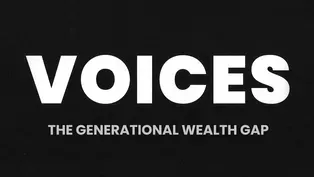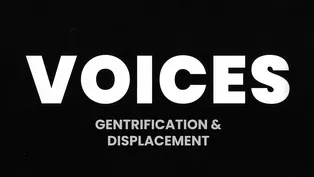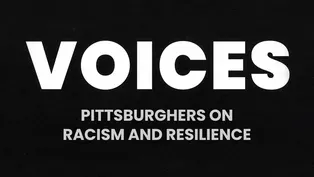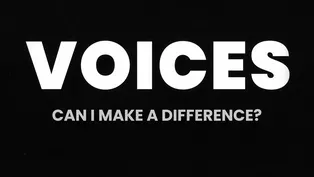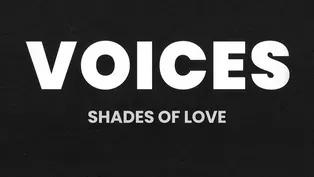WQED Digital Docs
VOICES: A Childbirth Crisis
4/16/2021 | 10m 9sVideo has Closed Captions
Decades of inequity in the healthcare system have led to a crisis in Black maternal health
Decades of inequity in the healthcare system have led to a crisis in Black maternal health. Mothers and babies are dying in childbirth at an alarming rate, much higher than their White counterparts. In this episode of VOICES, African American women from Pittsburgh share experiences where their voices were not heard, and the devastating consequences that resulted.
Problems with Closed Captions? Closed Captioning Feedback
Problems with Closed Captions? Closed Captioning Feedback
WQED Digital Docs is a local public television program presented by WQED
WQED Digital Docs
VOICES: A Childbirth Crisis
4/16/2021 | 10m 9sVideo has Closed Captions
Decades of inequity in the healthcare system have led to a crisis in Black maternal health. Mothers and babies are dying in childbirth at an alarming rate, much higher than their White counterparts. In this episode of VOICES, African American women from Pittsburgh share experiences where their voices were not heard, and the devastating consequences that resulted.
Problems with Closed Captions? Closed Captioning Feedback
How to Watch WQED Digital Docs
WQED Digital Docs is available to stream on pbs.org and the free PBS App, available on iPhone, Apple TV, Android TV, Android smartphones, Amazon Fire TV, Amazon Fire Tablet, Roku, Samsung Smart TV, and Vizio.
Providing Support for PBS.org
Learn Moreabout PBS online sponsorshipMore from This Collection
Video has Closed Captions
When a person of color goes missing, are they given the same consideration as other races? (11m 24s)
VOICES: Refugees: A New Life in Pittsburgh
Video has Closed Captions
Every year, hundreds of refugees arrive in Western Pennsylvania, hoping to start new. (7m 18s)
VOICES: The Impace of Gun Violence
Video has Closed Captions
While no two stories are the same, the impact of gun violence affects nearly everyone. (9m 38s)
Video has Closed Captions
Meet people who were moved by societal concerns to take action for the first time. (10m 48s)
Video has Closed Captions
Hear from formerly incarcerated local citizens on their experiences and hopes for change. (11m 8s)
Video has Closed Captions
This episode explores how derogatory terms enter the lexicon, and why words matter. (5m 52s)
VOICES: The Generational Wealth Gap
Video has Closed Captions
An absence of generational wealth among minority families often leads to obstacles. (7m 32s)
VOICES: Gentrification & Displacement
Video has Closed Captions
We look at gentrification and its impact on Pittsburgh's marginalized communities. (9m 59s)
VOICES: Pittsburghers on Racism and Resilience
Video has Closed Captions
Pittsburghers of different backgrounds share their encounters with discrimination. (10m 45s)
VOICES: Can I Make a Difference?
Video has Closed Captions
Pittsburgh area youth talk about today’s social climate, racism, inequity, and more. (6m 31s)
Video has Closed Captions
Two couples of reflect on their personal experiences with interracial relationships. (10m 26s)
Providing Support for PBS.org
Learn Moreabout PBS online sponsorship- We're seen in a certain light as more aggressive, as threatening, when we're speaking for ourselves or for our loved ones.
(soft inspired music) - Actual cortisol levels rise in Black women in America when they're pregnant.
(soft inspired music) - I think they look at their foul, and immediately, they make a judgment.
(soft inspired music) - My name is Syreeta Gordon, and I'm the lead doula and founder of Kangaroo Birthing and Maternity Concierge.
Birth doulas provide coaching support, and also, the advocacy support throughout their pregnancy.
I was a brand-new birth doula.
My client was a team mom.
We could hear the whispers of them talking about her in the hallways.
There was just a different air.
I can't explain, but other Black people know what that air is, when you feel like you're being judged.
On top of her being in pain, she's feeling that judgment.
(soft inspired music) - Health disparities are differences that we see in health outcomes or other outcomes.
Current thinking is that health disparities are not just any difference that we see.
They're differences that are rooted in historical inequities.
People talk about the Tuskegee Study a lot.
(poignant music) - One of the most shameful chapters in the history of American medicine.
Several hundred African-American men were used in the study.
(poignant music) The Public Health Service followed the men's lives, all the while, withholding medicine.
(poignant music) - People remember those instances.
(poignant music) While we have gotten a lot better with research regulations and so forth so that a lot of these things don't happen, people are still experiencing differential treatment when they're going to see their doctor.
(poignant music) - My name is Brandy Gentry, and I'm the founder of Oli's Angels Inc., which is a comprehensive birth and bereavement support service.
In 2010, I suffered a stillbirth.
And I found that as I was experiencing the loss of my son, there were a lot of gaps in care.
I began working with a young Black woman.
Her baby had a chromosomal defect, so we knew that, either during delivery or shortly thereafter, the baby would pass away.
She'd gone past her due date, and she was feeling pretty happy that she'd most likely get to meet her daughter.
Her last prenatal visit, she was requesting an induction of labor.
She really intuitively felt like this is what she needed to do.
She wanted to meet her baby.
The baby was still alive.
It seemed like a good idea.
The attending denied the induction.
They were just gonna let her go into labor naturally.
On Monday morning, I received a phone call.
She was in labor, and she was screaming hysterically, because her baby had died.
When I arrived at the hospital, the OB asked to speak with me.
She told me that the baby had been dead for at least three days, which meant that the day that we were there was most likely the last day that the baby was alive.
She went on to share with me that, because of the position of the baby and the fact that the baby had already been gone for so many days, there was a chance that the baby could be decapitated during birth, and she wanted me to go in and prepare this mom.
I've seen a lot of things now, and I've heard a lot of things, and I've walked with people through some really complicated birth experiences, but this just rocked my world.
(poignant music) Had they listened on Thursday, had they found a way to listen to that mother's heart, her instincts, and consider all that she'd already been through with the hope of meeting the baby.
(poignant music) There's a theory that I've learned about poor outcomes in maternal child health in the Black community and it's called denial and delay.
So, they deny what the Black woman says as truth.
Therefore, they delay response in care, and this is how we reach outcomes like my client's.
- My name is Dr. Sylvia Owusu-Ansah.
I am the assistant professor of pediatrics at the University of Pittsburgh School of Medicine, as well as the EMS medical director at UPMC Children's Hospital of Pittsburgh.
Many African-Americans and Blacks all can speak to not having great experiences in the medical system.
It'd be nice to say that this is something that happened in the past and now we've learned from out mistakes, and we're doing something different, but almost every person of color has a story.
As a physician, I had my second child post-partum, and half of my face felt like it melted.
It was paralyzed.
I didn't want to leave the hospital.
My OBGYN told me that it was just anaphylaxis, which is a severe allergic reaction, which you wouldn't have on one side of your face.
I had to plead and fight.
They had, prior to my discharge, written down that I was an anxious person that was refusing anxiety medication.
And I felt, to some degree, that, because of who I was as an African-American female, that had a lot to do with my treatment.
(poignant music) So, unfortunately, I went home, and, luckily, my best friend, who is an excellent neurologist, FaceTimed me and diagnosed Bell's palsy.
And I was able to come in the next day and get a further stroke workup.
(typing) (poignant music) - When I experienced my loss, I had noticed a decrease in fetal movement.
The physician on call encouraged me to eat ice cream and lay on my left side, and he instructed that the sugar would jolt the baby to move.
Just eight days later, on Christmas day, I was in labor.
When we arrived at the hospital, no heartbeat was detected.
He was gone.
If I had been instructed to come in and be seen as a preventative measure, it would have been seen on ultrasound that all of the blood flow and all of the oxygen was restricted, and he was in distress.
(poignant music) Until we stop denying, stop delaying, we're never gonna trust, and outcomes are not going to improve.
(poignant music) - It's hard for people to come to the hospital and interact with their primary care physician or their healthcare provider if they don't feel like their healthcare provider has their interests at heart.
What really needs to happen is we need to, as a healthcare system, begin to go to the community, meet them where they are and where they need us to be, and let them get to know us to build trust.
- A huge part of doula work as a whole is that we are certified home visitors.
Home visiting actually improves birth outcomes.
- I feel like we are thinking outside the box and trying to reach Black women.
- My biggest hope is that we can rebuild trust, and healing can begin.
(soft inspired music)
WQED Digital Docs is a local public television program presented by WQED
